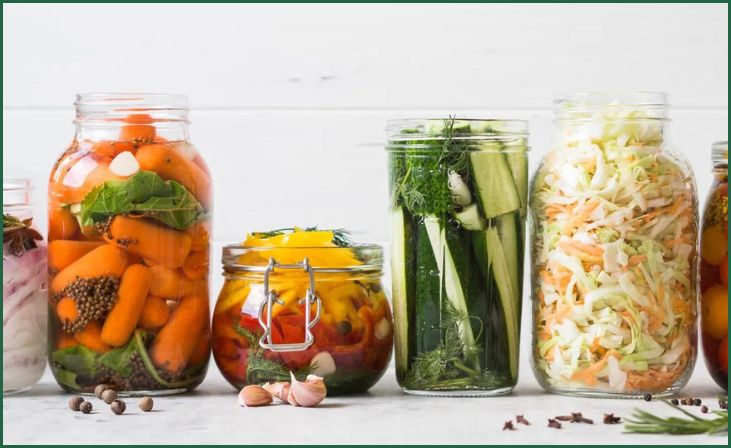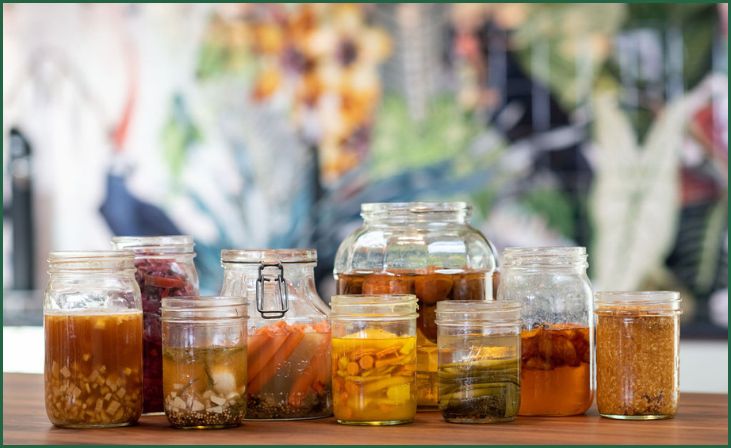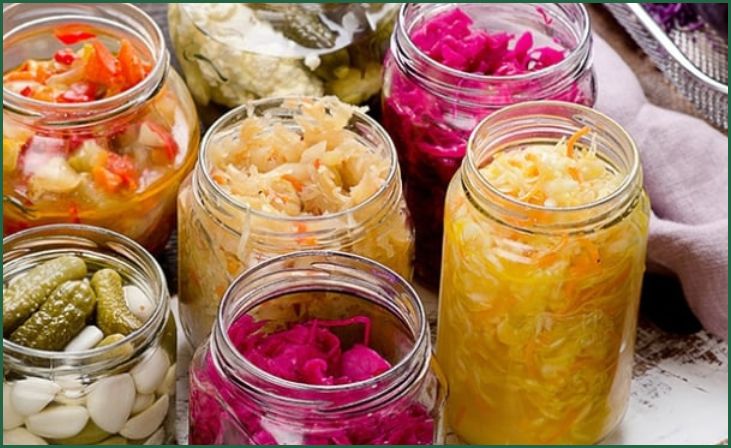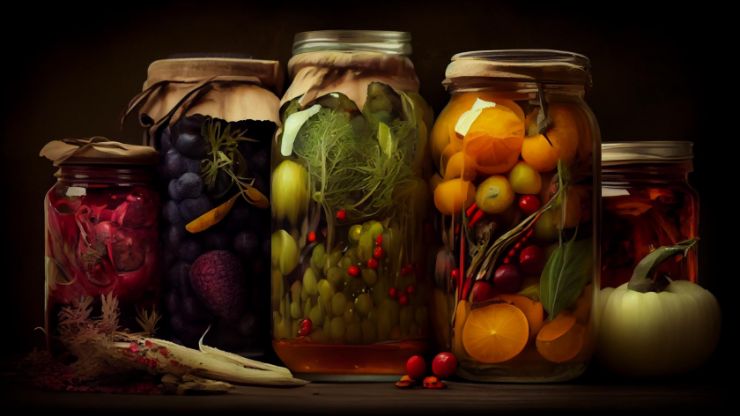Welcome to our informative guide on understanding and managing the potential risks of botulism in fermented foods. As the popularity of homemade and artisanal fermented products grows, it’s crucial to be aware of the associated risks and take necessary precautions. In this blog, we’ll delve into the specifics of botulism, its connection to fermented foods, and how you can safely enjoy these delicious treats.
Table of Contents
ToggleIs There A Botulism Risk in Fermented Foods?

Yes, there is a potential risk of botulism in fermented foods. Botulism is a rare but serious illness caused by the Clostridium botulinum bacterium, which produces a toxin harmful to humans.
Inadequate fermentation conditions or improper storage of fermented foods can create an environment conducive to the growth of this bacterium. It is crucial to follow proper hygiene practices, use high-quality ingredients, and adhere to recommended fermentation guidelines to minimize the risk of botulism in fermented foods.
Also Read: How Long Can You Leave Your Fermented Foods?
Factors Mitigating Botulism Risk in Fermented Foods

Mitigating the risk of botulism in fermented foods involves a combination of factors that focus on creating and maintaining conditions unfavorable to the growth of Clostridium botulinum bacteria and the production of its toxin. Here are key factors to consider:
- Hygiene Practices:
- Ensure cleanliness throughout the fermentation process. Sterilize equipment, containers, and utensils to prevent the introduction of harmful bacteria.
- Wash hands thoroughly before handling ingredients or working with fermented foods.
- Quality of Ingredients:
- Use fresh and high-quality ingredients. Botulism risk can increase with contaminated or spoiled raw materials.
- Inspect vegetables, fruits, and other components for signs of damage or decay before fermentation.
- Acidity Levels:
- Maintain proper acidity levels during fermentation. Acidic conditions inhibit the growth of C. botulinum.
- Use starter cultures that encourage the development of lactic acid, which helps create an environment hostile to botulism.
- Salt Concentration:
- Utilize the appropriate amount of salt as it contributes to the preservation of fermented foods. This hinders the growth of harmful bacteria, including C. botulinum.
- Follow recommended salt concentrations in recipes to achieve the desired balance.
- Fermentation Time and Temperature:
- Adhere to recommended fermentation times and temperatures. Extended fermentation periods may increase the risk of botulism.
- Maintain a controlled and consistent fermentation environment to prevent the proliferation of harmful bacteria.
- Proper Sealing and Storage:
- Use airtight containers to seal fermented foods. This minimizes exposure to oxygen, creating an anaerobic environment less favorable for C. botulinum.
- Store fermented products in a cool environment to slow down microbial activity and reduce the risk of spoilage.
- Monitoring for Spoilage:
- Regularly inspect fermented foods for any signs of spoilage, such as off smells, unusual textures, or mold growth.
- Discard any batches that show signs of contamination or deterioration.
- Educational Resources:
- Stay informed about safe fermentation practices through reputable sources and educational materials.
- Follow established recipes and guidelines to ensure a proper balance of ingredients and fermentation conditions.
Also Read: Fermenting in Hot Weather
Don't just scroll, subscribe!
BuzzTrail's unique web-stories are the cure for boredom you've been waiting for.
By integrating these factors into the fermentation process, individuals can significantly reduce the risk of botulism in fermented foods and enjoy the benefits of this traditional preservation method safely.
Ensuring Safety in Fermented Foods

Ensuring safety in fermented foods involves a combination of best practices to minimize the risk of harmful bacterial contamination, including botulism. Here’s a comprehensive guide to help guarantee the safety of your fermented creations:
- Sanitation and Hygiene:
- Start with clean hands, utensils, and fermentation vessels. Proper sanitation prevents the introduction of harmful bacteria during the preparation and fermentation processes.
- Quality Ingredients:
- Use fresh, high-quality ingredients free from spoilage or contamination. Inspect vegetables, fruits, and other components before starting the fermentation process.
- Water Quality:
- Use clean, filtered water. Contaminated water can introduce harmful microorganisms that compromise the safety of the fermentation.
- Salt and Acidity Levels:
- Maintain the correct balance of salt and acidity in your fermentation. Adequate salt inhibits harmful bacteria, while the acidity discourages the growth of pathogens like Clostridium botulinum.
- Temperature Control:
- Control fermentation temperatures to promote the growth of beneficial microorganisms and inhibit the growth of harmful ones. Follow recommended temperature ranges for the specific fermentation process.
- Use of Starter Cultures:
- Introduce starter cultures to kickstart fermentation with beneficial bacteria. This helps create an environment where harmful bacteria, including pathogens like C. botulinum, are less likely to thrive.
- Airtight Sealing:
- Use airtight containers for fermentation. This prevents the entry of oxygen, creating an anaerobic environment that supports the growth of lactic acid bacteria and inhibits the growth of harmful microbes.
- Monitoring and Observation:
- Regularly check the appearance, smell, and taste of fermenting foods. Any signs of spoilage, off odors, or unusual textures may indicate a problem. Discard any batches showing signs of contamination.
- Proper Fermentation Time:
- Adhere to recommended fermentation times. Over-fermentation can lead to undesirable changes in texture and taste, and in some cases, may pose safety risks.
- Educate Yourself:
- Stay informed about safe fermentation practices through reputable sources. Knowledge about the specific requirements of different fermented foods enhances safety and quality.
- Record Keeping:
- Keep detailed records of your fermentation processes, including ingredients, quantities, and fermentation conditions. This helps identify patterns and troubleshoot any issues that may arise.
- Storage Conditions:
- Store fermented products in a cool environment, such as a refrigerator, to slow down microbial activity and extend shelf life. Follow recommended storage times for each type of fermented food.
Also Read: Can You Ferment Different Foods in the Same Room?
By following these guidelines, you can enjoy the benefits of fermented foods while minimizing the risk of contamination and ensuring a safe and delicious final product.
Conclusion
In conclusion, exploring the world of fermented foods is an exciting culinary adventure, but it comes with responsibilities. Understanding the potential botulism risks and implementing preventive measures are essential for enjoying these delicacies safely.
By following recommended guidelines and staying informed, you can savor the flavors of fermentation without compromising your health. Cheers to a delicious and risk-aware fermentation journey!
FAQs
What is botulism, and how does it relate to fermented foods?
What is botulism, and how does it relate to fermented foods?
Botulism is a rare but serious illness caused by a toxin produced by the bacterium Clostridium botulinum. Fermented foods, if not prepared and stored properly, can create an environment conducive to the growth of this bacterium. The toxin can lead to severe health issues, making it crucial to understand and mitigate the risks associated with fermented foods.
How can I reduce the risk of botulism when fermenting at home?
How can I reduce the risk of botulism when fermenting at home?
To minimize the risk of botulism, follow strict hygiene practices, use high-quality ingredients, and ensure proper fermentation conditions. Maintain proper acidity levels, use appropriate salt concentrations, and follow reputable recipes. Additionally, store fermented foods in a cool environment and be cautious of any signs of spoilage, such as off smells or unusual textures.

